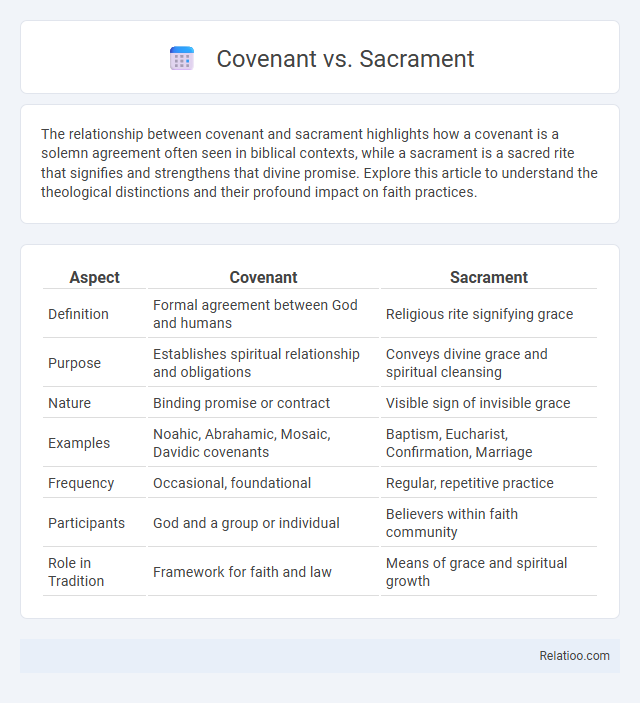The relationship between covenant and sacrament highlights how a covenant is a solemn agreement often seen in biblical contexts, while a sacrament is a sacred rite that signifies and strengthens that divine promise. Explore this article to understand the theological distinctions and their profound impact on faith practices.
Table of Comparison
| Aspect | Covenant | Sacrament |
|---|---|---|
| Definition | Formal agreement between God and humans | Religious rite signifying grace |
| Purpose | Establishes spiritual relationship and obligations | Conveys divine grace and spiritual cleansing |
| Nature | Binding promise or contract | Visible sign of invisible grace |
| Examples | Noahic, Abrahamic, Mosaic, Davidic covenants | Baptism, Eucharist, Confirmation, Marriage |
| Frequency | Occasional, foundational | Regular, repetitive practice |
| Participants | God and a group or individual | Believers within faith community |
| Role in Tradition | Framework for faith and law | Means of grace and spiritual growth |
Understanding Covenant: Definition and Origins
A covenant is a solemn agreement between two parties, often characterized by mutual commitments and divine promises, originating in ancient religious traditions such as Judaism and Christianity. Unlike sacraments, which are sacred rites symbolizing grace, covenants establish foundational relationships between God and humanity, including the Abrahamic and Mosaic covenants. Understanding the origins of covenants involves examining biblical texts like Genesis and Exodus, where God's covenantal promises to figures like Abraham and Moses define the narrative of divine-human interaction.
What is a Sacrament? Meaning and Background
A sacrament is a sacred rite recognized in Christian traditions as a means of divine grace, symbolizing a spiritual reality through physical elements like water, bread, or wine. Rooted in early church practices, sacraments such as Baptism and the Eucharist serve as outward signs instituted by Christ, conveying inward spiritual blessings to believers. Your understanding of sacraments enhances the appreciation of how these rituals connect faithful individuals to the covenantal promises between God and humanity.
Biblical Foundations of Covenants
Biblical foundations of covenants highlight distinct divine agreements, with covenants serving as solemn, binding promises between God and humanity, often involving conditions and signs such as circumcision or rainbow. Sacraments, rooted in biblical tradition, function as sacred rites symbolizing and imparting divine grace, exemplified by baptism and the Eucharist in Christian practice. Covenant emphasizes personal and communal relationships established by God's enduring faithfulness, underscoring key biblical covenants with figures like Noah, Abraham, Moses, and David.
Theological Basis for Sacraments
The theological basis for sacraments lies in their role as outward and visible signs of inward and spiritual grace, instituted by Christ to confer sanctifying grace upon the believer. Sacraments differ from covenants by serving as specific means of grace that actualize the believer's union with God, whereas covenants represent solemn agreements or promises between God and humanity. This sacramental theology emphasizes the tangible participation in divine life through rituals such as baptism and Eucharist, grounded in scriptural mandates and apostolic tradition.
Key Differences Between Covenant and Sacrament
A covenant is a solemn agreement or promise between God and humans, characterized by mutual commitments and often marked by specific signs or rituals, whereas a sacrament is a sacred rite instituted by Christ that imparts grace and signifies a divine mystery. Key differences include that covenants establish a relational framework encompassing obligations and blessings, while sacraments function as tangible means of grace through ritual actions like baptism or communion. Unlike sacraments, which are universally recognized rites within Christian denominations, covenants vary in scope and form, representing foundational theological agreements rather than ritual practices.
Symbolism in Covenants and Sacraments
Covenants symbolize solemn agreements between God and humans, marked by signs like the rainbow in Noah's Covenant or circumcision in Abraham's, representing divine promises and mutual commitments. Sacraments embody sacred rites such as Baptism and Eucharist, where physical elements like water and bread symbolize spiritual grace and participation in the divine life. Your understanding deepens by recognizing that covenants emphasize relational vows, while sacraments express these relationships through ritualized, symbolic acts.
Role of Covenant in Christian Faith
The covenant in Christian faith serves as a foundational divine agreement between God and humanity, establishing sacred promises and responsibilities that shape spiritual life. Unlike sacraments, which are outward rituals like baptism and communion symbolizing grace, covenants emphasize enduring spiritual obligations and relational commitments foundational to salvation history. Your understanding of God's covenant reveals the continuity of His faithfulness from Old Testament promises to New Testament fulfillment through Jesus Christ.
Purpose of Sacraments in Christian Worship
Sacraments in Christian worship serve as visible signs of God's grace, intended to strengthen faith and foster a deeper spiritual connection between believers and God. Unlike covenants, which are solemn agreements or promises between God and humanity, sacraments function as sacred rituals that embody divine mysteries and facilitate the believer's participation in the life of Christ. The primary purpose of sacraments, such as baptism and the Eucharist, is to sanctify the faithful and nurture their spiritual growth within the communal context of the church.
Covenant and Sacrament Across Christian Denominations
Covenant in Christian theology signifies a solemn agreement between God and humanity, foundational to both Old and New Testament teachings, shaping relationships across denominations. Sacrament refers to sacred rites, such as baptism and the Eucharist, recognized as outward signs of inward grace, though interpretations vary among Catholic, Orthodox, and Protestant traditions. Understanding the covenantal basis of sacraments highlights their role in manifesting divine promises and communal faith within diverse Christian practices.
Contemporary Relevance: Covenant vs Sacrament
Covenants shape Your spiritual identity by establishing divine promises and responsibilities, while sacraments serve as visible rites that convey grace and reinforce faith within religious communities. In contemporary practice, covenants emphasize ongoing relational commitments with God, whereas sacraments provide tangible, communal experiences of sacred truths. Understanding the distinction enhances the meaningful engagement with spiritual life and religious ceremonies today.

Infographic: Covenant vs Sacrament
 relatioo.com
relatioo.com